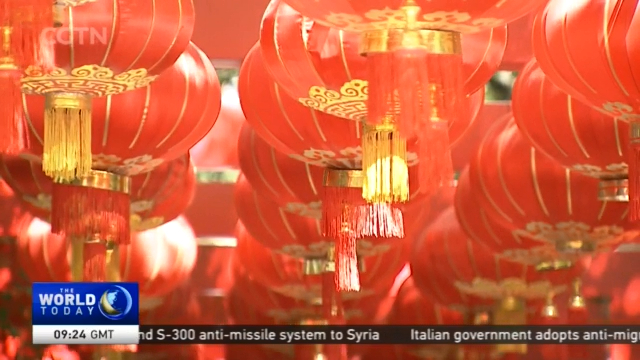
17:42, 25-Sep-2018
Mid-Autumn Festival Festivities: Beijing's Yuetan Park a traditional gathering point for celebrations
Updated
16:52, 28-Sep-2018
03:16

Beijing was once home to four major imperial temples, including ones that worshipped Heaven, Earth, the sun, and the moon. They've now all been turned into public parks, and for the Mid-Autumn Festival, Yuetan Park draws some of the biggest crowds. The moon is the center of attention there. CGTN's Omar Khan paid a visit to the ancient site of sacrifice, to check out this year's celebrations.
Originally the site of an altar used by China's Ming dynasty emperors to offer sacrifices to the moon, Beijing's Yuetan Park is now a green space with few remnants of the past. Several rebuilt walls and passageways, and a courtyard with a small pond are nearly all that remain. Yet every year during China's Mid-Autumn Festival, it's not so much the aesthetics of these historic grounds, that matter.
ZHANG YU BEIJING LOCAL "We come here every Mid-Autumn Festival because it's close to our home. The special cultural events are within walking distance. For adults, it's a place to relax, and for kids, it's a chance for them to learn about traditional Chinese culture."
AN YAN BEIJING LOCAL "Actually I think me and my daughter have both learned something during our time here. We've seen so many things including Tu Er Ye and Chinese New Year Paintings. We also participated in making handicrafts."
This year's holiday celebrations are similar to past ones. Parents bring their youngsters to enjoy performances and dances together. Displays of Tu er Ye - the rabbit deity of moon goddess Chang'e - have also been set up. And later in the night, revellers will see these lanterns light up a glowing red, giving the park an even more festive atmosphere.
OMAR KHAN YUETAN PARK, BEIJING "For the people of Beijing and for those who've travelled here, this is a place where reconnecting with traditions, is still possible. And although we're several hours away from the sun setting, those here will be hoping for a full moon to look up at."
This annual Chinese holiday is not complete without mooncakes and references to the moon itself. So why is earth's nearest celestial neighbor so important? And what does it signify?
AN YAN BEIJING LOCAL "Family reunion. Chinese people consider reuniting with family members as an important thing. Especially during the Mid-Autumn Festival, we really love to get together with our relatives."
QIU LINGJIANG BEIJING LOCAL "The moon during Mid-Autumn Festival represents family reunion, well-being, happiness and best wishes for all of the people in your family. It means being together. It is snug and sweet. It's a very good day to bring the kids out and play. Sweetheart, are you having a fun time today?"
Traditionally, ancient Chinese would perform ritual sacrifices to the moon - and only once it disappeared from the sky, would people eat. Despite old customs having faded, these folks don't need any excuses to get together with loved ones, and enjoy the occasion. Omar Khan, CGTN, Beijing.

SITEMAP
Copyright © 2018 CGTN. Beijing ICP prepared NO.16065310-3
Copyright © 2018 CGTN. Beijing ICP prepared NO.16065310-3